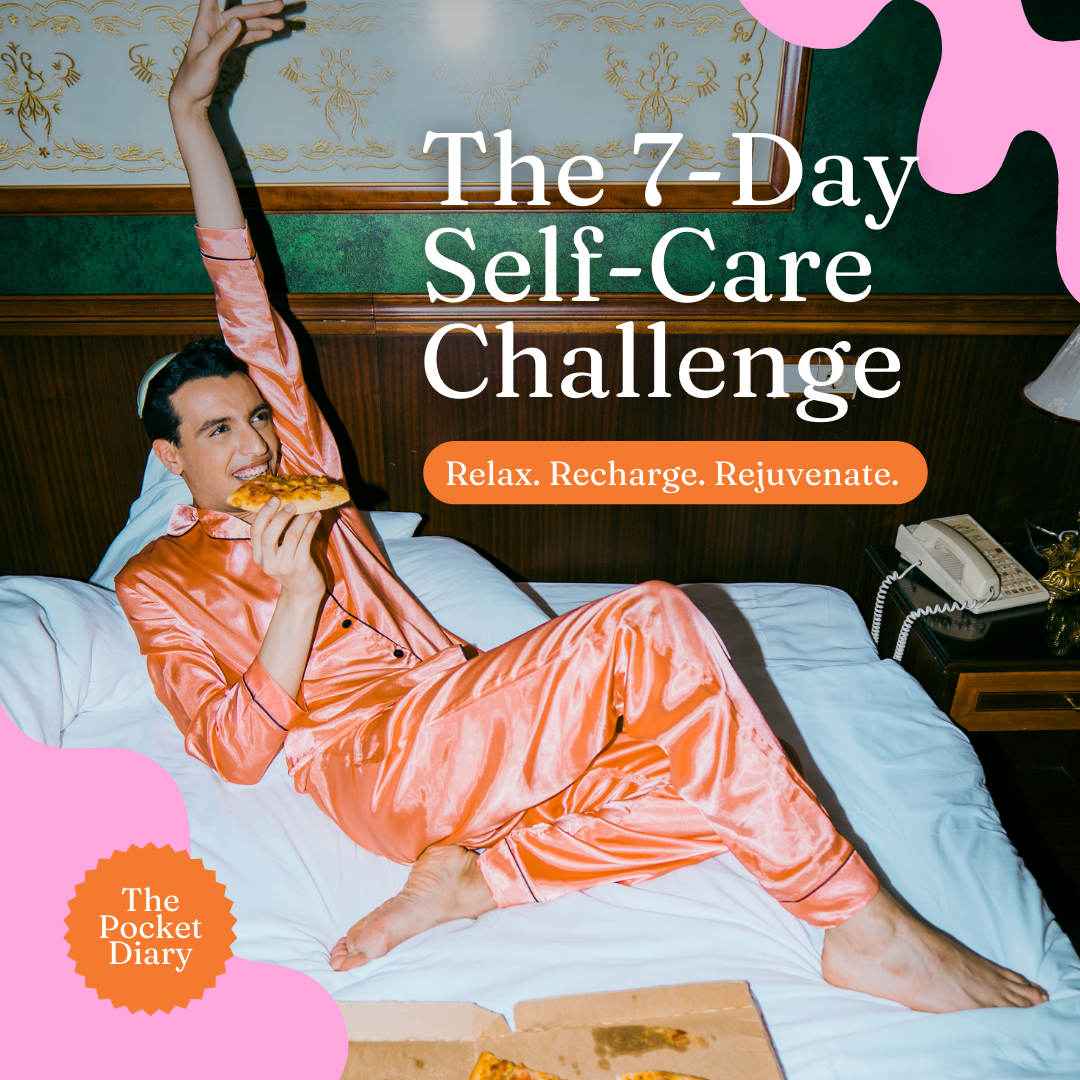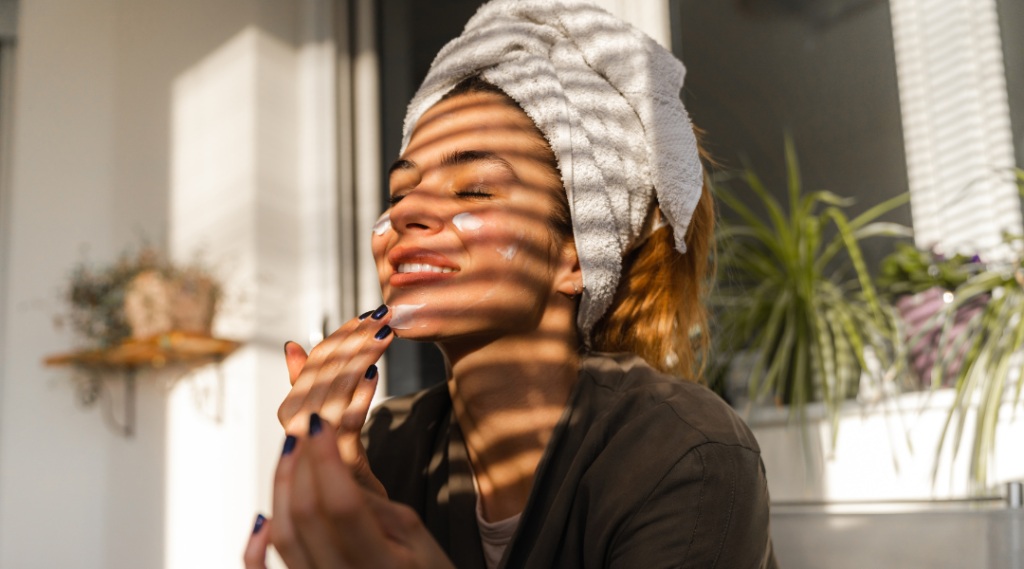The 7-Day Self-Care Challenge: Improve Your Overall Well-Being

What Is Self-Care?
Self-care is all about making intentional acts to take care of yourself. A self-care challenge is a great way of focusing on different aspects of self-care, including in physical, mental, or emotional forms.
Self-care is all about taking conscious actions that prioritize your health, happiness, and overall quality of life.
What Is The Self-Care Challenge?
As the name suggests, the self-care challenge is a period of time where you set aside designated actions to better your life and self-care rituals. Self-care challenges are often very diverse, some being 7 days, some 21, or even 30 days.
Each self-care challenge will offer its unique set of daily actions, each being a different length of time (like one week, or one month).
This blog post covers:
What’s Included In This 7-Day Challenge?
This 7-day self-care challenge aims to incorporate all forms of self-care – that being mental self-care, physical self-care, emotional self-care and more. Each day will target a different form of self-care.
By focusing on different forms of self-care each day, we can accomplish an overall improved self-care routine instead of hyper-focusing on just one area (i.e., just mental self-care).

The Purpose Of The Self-Care Challenge
The purpose of this self-care challenge is to learn ways to improve our self-care rituals and routines.
By sticking to a self-care agenda (Like this challenge), we learn to commit ourselves to various self-care rituals that are meant to help improve our lives emotionally, mentally, and physically.
The aim is to come out of the 7-day self-care challenge by learning new ways to practice better self-care and adopt new healthy practices that can help level up and improve our lives on a daily and long-term basis.
The 7-Day Self-Care Challenge
On the first day of your self-care challenge, start your day with 5 minutes of deep breathing or meditation. Set a positive intention for the day ahead and be fully present in the moment.
For a mindful morning, practice gentle exercises as you consciously move your body.
Why Is Moving Your Body In The Morning Important?
Morning movement helps increase blood flow and oxygen circulation, which can wake up your body and mind. It also provides a natural energy boost that can set a positive tone for the rest of the day.
A few examples of gentle mindful morning exercises to practice include:
- Neck Stretches: Gently tilt your head from side to side, forward and backward to release tension in your neck.
- Shoulder Rolls: Roll your shoulders forward and backward in a circular motion to loosen up your shoulder muscles.
- Arm Circles: Extend your arms to the sides and make small circles with your hands, gradually increasing the size of the circles.
- Torso Twists: Stand with your feet hip-width apart and gently twist your upper body from side to side, keeping your hips facing forward.
- Hip Circles: Stand with your hands on your hips and rotate your hips in a circular motion, first in one direction and then the other.
Day 2: Gratitude Practice
On day 2 of your self-care challenge, write down three things you’re grateful for. Reflect on the positive aspects of your life and let gratitude guide your mindset.
When you’re writing down what you’re grateful for, try to be as specific as possible. Instead of saying “I’m grateful for my family,” you might write “I’m grateful for the support my family showed me when I needed it.”
Aim to keep your gratitude on the positive experiences, people, and things in your life. Consider why they are meaningful to you, and why you wrote them down in the first place.
When your mind starts to wander, or if you’re facing challenges of negative thoughts, make the best effort to intentionally shift your focus to the things you’re grateful for. Flip negative thoughts into something that’s positive. This can help change your perspective, overall mindset, and and help alleviate stress.
A great way to practice gratitude is through affirmations. You can practice affirmations by saying them out loud or writing them down in a journal. For ideas on how to start your gratitude on your 7-day self-care challenge, here are 50 Gratitude Affirmations For Self-Love.
Day 3: Technology Detox
On day 3 of your self-care challenge, try to unplug from screens for at least two hours. Use this time to engage in offline activities like reading, going for a walk, or having a meaningful conversation.
Why is technology detox important?
Constant exposure to notifications, messages, and information overload can lead to increased stress and anxiety. Taking a break from technology allows your mind to rest, recharge and focus. other activities that really matter.
What Time of Day Is Best for a Technology Detox?
The best time of day for a technology detox depends on your personal schedule and preferences, however here are a few great examples of when to do a technology detox:
- Morning: Starting your day with a technology detox can set a positive tone for the rest of the day. You can use the morning to engage in activities like meditation, exercise, reading, or spending quality time with loved ones.
- Evening: An evening technology detox can help improve your sleep quality. Disconnecting from screens an hour or two before bedtime can reduce the impact of blue light on your sleep hormone production.
- During Meals: Detoxing during meals encourages mindful eating and meaningful conversations with family or friends. Put away devices and focus on enjoying your food and company.
Day 4: Movement and Nature
On day 4 of your self-care challenge, take a 20-minute walk outside. Embrace the natural world around you, breathe in fresh air, and let the movement invigorate your body.
What are the benefits of movement in nature?
Exercising in nature has SO many benefits.
Movement in nature allows you to connect with your body in a holistic way. The changing terrain, fresh air, and natural elements engage your senses and create a more immersive experience.
The calming effects of nature complement the stress-reducing benefits of exercise. The combination can significantly lower stress hormone levels and promote relaxation. Nature and physical activity both stimulate the release of endorphins, resulting in improved mood, reduced anxiety, and a greater sense of well-being.
Some examples of movement in nature include:
- Hiking: Explore trails through forests, mountains, or hills, enjoying the scenic beauty and varying levels of difficulty.
- Trail Running: Combine the joy of running with the challenges and diverse terrain of nature trails.
- Cycling: Ride your bike on nature trails, through parks, or along scenic routes with beautiful landscapes.
- Yoga: Practice yoga outdoors, whether it’s on a beach, in a park, or on a grassy field.
- Outdoor Games: Play games like frisbee, soccer, or touch football in open fields or parks.
- Birdwatching: Combine slow walking with the observation of local bird species in their natural habitats
Day 5: Creative Expression
On day 5 of your self-care challenge, be sure to engage in a creative activity you enjoy. Whether it’s drawing, writing, crafting, or playing an instrument, let your creativity flow without judgment.
Why practice creative expression?
Well, there are numerous benefits. Not only does creative expression serve as an emotional outlet, engaging in creative activities is a form of relaxation and stress relief. Immersing yourself in a creative process can help divert your mind from worries and reduce feelings of tension as well.
Here are a few other examples of how you can practice creative expression:
- Photography
- Coloring
- Collaging
- Booking or baking
- Dancing
- Calligraphy
- Origami
- Self-love photoshoot
- Pottery or sculpting
Day 6: Pamper Yourself
On day 6 of your self-care challenge, treat yourself to a relaxing self-care session. Take a bath, do a face mask, or practice a soothing skincare routine. Indulge in activities that make you feel nurtured.
Some other ideas on how you can pamper yourself include:
- Take a Bubble Bath: Run a warm bath with your favorite bath salts or bubbles, light some candles, and enjoy a relaxing soak.
- Have a Spa Day at Home: Create a DIY spa experience with face masks, body scrubs, and relaxing music.
- Get a Massage: If possible, schedule a professional massage or give yourself a gentle self-massage.
- Read a Book: Set aside time to read a book you’ve been wanting to dive into, whether it’s fiction, self-help, or a magazine.
- Listen to a Relaxation Podcast: Tune in to a podcast that focuses on relaxation, meditation, or well-being
- Start a Gua Sha routine: Among the Gua Sha’s many benefits, you can improve your lymphatic drainage and reduce puffiness in your face with a Gua Sha stone.
Why Pamper Yourself Today?
Taking time to relax and rejuvenate helps you recharge and better handle life’s challenges. Pampering yourself is a time for self-appreciation, and can significantly boost your mood by triggering the release of endorphins, the “feel-good” hormones. It’s a natural way to uplift your spirits and promote a positive outlook.
It’s important to set one day per week reserved for pampering yourself filled with self-care rituals. With how hectic and busy our lives can get, your body will thank you in the future that you took the time to take care of your physical and mental state.
If you need some idea on how to pamper yourself, check out this guide to the perfect self-care Sunday.
Day 7: Digital Reflection
On the last day of the self-care challenge, reflect on the past week of self-care activities. Among your reflection, consider a few of the below questions during your reflection:
- How did each activity make you feel?
- Which practices resonated with you the most?
- Which practices did you not find enjoyable?
Use your reflection thoughts as insight to guide your ongoing self-care routine and see which forms of self-care you can keep in your routine for the long term, and which ones were just nice to try for the week!
Bottom Line: The 7-Day Self-Care Challenge: Improve Your Overall Well-Being
The 7-day self-care challenge was made to help improve your life in different ways, including emotionally, physically, or mentally.
Sticking to a self-care challenge helps us to keep ourselves accountable by committing to a scheduled agenda of daily practices, and offering feelings of gratification when we successfully complete them.
From this blog post, we hope you’ve learned new self-care practices to begin incorporating into your daily rituals and within your own self-care journey.